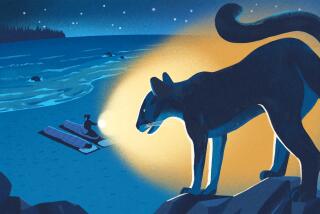Missing Riverside County Boy, 9, Might Have Been Attacked by Cougar
- Share via
The location and condition of a child’s skull and bones found near a Big Bear area campground where a 9-year-old boy disappeared last July indicate he may have been killed by a mountain lion, authorities said Tuesday.
San Bernardino County medical examiners are using dental records and DNA tests to determine if the remains that were found during the weekend by hikers and sheriff’s deputies are those of David Gonzalez,who lived in Lake Elsinore and whose disappearance triggered a massive search-and-rescue effort last summer.
The bones were found about a mile southwest of the Hanna Flat campground, near Fawnskin, and showed no obvious trauma to the skull or signs of foul play, said San Bernardino County sheriff’s spokesman Chip Patterson. The family had been camping at Hanna Flat on July 31.
Authorities believe a cougar may have attacked the boy in the woods and then dragged his body to an isolated area, which would explain David’s sudden disappearance and why rescuers could not find him, Patterson said.
“Explanations can be found in the lack of evidence,” he said. “It was such a thorough search, and there were so many resources used, you wonder why we couldn’t find him there. We searched that exact area.... Why couldn’t he hear or see the people looking for him? Why couldn’t we find him? This theory fits with what we don’t know.”
However, finding conclusive evidence that the child whose bones were found was killed by a wild animal will be difficult, said San Bernardino County Deputy Coroner Randy Emon. “It’s not unusual in bone cases to find animal activity, gnaw marks. Determining if animal activity on bones was pre-mortem or postmortem is grasping at straws. We might need an animal-tooth expert on this, but generally, the cause and manner of death in a case like this will be undetermined.”
At the white mobile home in Perris where the Gonzalez family now lives, news of the discovery of a child’s remains brought little relief to David’s father, Jose.
“God has given us strength,” Gonzalez said in Spanish from his front porch. “It didn’t come as a surprise. We’ve been waiting for some news, be it bad or good. We are waiting to see what happens. It could be our son, it could not be. If it is, I thank God that he is with him.”
Jose and his wife, Rosenda, now have a 3-month-old son, Abraham, and moved from Lake Elsinore to Perris in November.
Jose Gonzalez, 40, said he believed his son was kidnapped and was alive. He said he doubted his son was killed by a mountain lion, since the boy was out of his sight for only three minutes before he starting looking for him. He also said he was certain that if a mountain lion had attacked David, he would have heard a cry for help.
“When they were looking, they didn’t find a bit of blood or clothing,” he said, adding he carries his son’s picture with him and hopes to see him alive again.
Still, sheriff’s Deputy Jesse Venegas said he had told the Gonzalezes to brace themselves for the remains to be identified as their son’s.
“The bones we found are of a child’s, in an area where David was lost, and no other child has gone missing in that campground ever,” Venegas said.
David disappeared after asking for the keys to the family pickup so he could get some cookies. Witnesses reported seeing him walking along a nearby road around that time, but he never returned to the camp.
An intensive search-and-rescue effort lasting nine days was launched, but rescuers failed to find any sign of the boy.
A spokeswoman for the San Bernardino County Sheriff’s Department, Robin Haynal, said it was possible that after the boy strayed from his parents’ campsite in the San Bernardino Mountains, he suffered fatal injuries in a fall or died as a result of having no food or water.
Detectives interviewed all registered sex offenders living in the area, and took statements from all but three of the people who camped at the 88-spot Hanna Flat site on the day David disappeared.
The interviews did not point to an abduction, Patterson said, adding that the finding of the bones on the ground’s surface “doesn’t fit the pattern of a body dump.”
During the search, a crew of animal trackers brought in by the U.S. Fish and Wildlife Service and San Bernardino County Animal Control reported that search dogs treed a mountain lion in the days after the boy disappeared. A mountain lion was also seen crossing a nearby road five days after David vanished, Patterson said.
Wildlife biologists have told sheriff’s officials that mountain lions typically cover their dead prey in leaves and branches to hide it from other predators, Patterson said.
Last year’s search drew 100 to 250 official and volunteer searchers each day. Patterson said the animal-behavior experts said a mountain lion’s consumption of its prey can eliminate scents that search dogs can locate.
“We were told the big cats can drag their prey one to three miles away, that they like to take it to a secluded area,” he said. “There had to be a reason he wasn’t being seen.”
More to Read
Sign up for Essential California
The most important California stories and recommendations in your inbox every morning.
You may occasionally receive promotional content from the Los Angeles Times.











